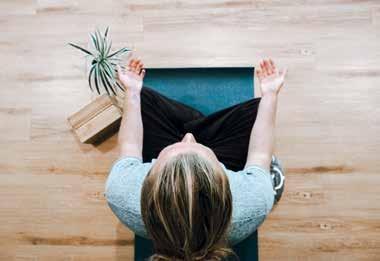
2 minute read
Take a break and focus on your mental wellbeing

A new year is the time we traditionally look at every aspect of our lives – home, family, work, health – and do a general audit to see what’s working and what we can improve on. Whether or not you are an advocate of the New Year, New You premise, there is no better time than now to have a look at your mental wellbeing.
According to the NHS, evidence suggests that there are five steps you can take to improve your mental health and wellbeing.
1. Connect with other people
Good relationships are important for your wellbeing because they help you build a sense of belonging and self-worth, give you an opportunity to share positive experiences and help you support others.
• Take time daily to be with your family e.g. eat dinner together
• Arrange a day out with friends.
• Switch off the TV to talk or play a game with your children, friends or family
• Have lunch with a colleague
• Visit a friend or family member who needs support or company
• Volunteer at a local school, hospital or community group
• Have a video chat to keep in touch with a relative or friend who you can’t see face-to-face or ring them for a chat (try not to rely solely on social media and text messages to keep in touch)
2. Be physically active
Not only does being active improve your physical health and fitness but it also improves your mental wellbeing by raising your self-esteem, helping you to set and achieve goals; and causing chemical changes in your brain to positively change your mood.
Don’t feel you have to spend hours in a gym if that’s not your bag. Have a read up on different activities you can try to keep active including running, aerobic exercises, classes, and strength and flexibility exercises.
3. Learn new skills
This can boost self-confidence, raise self-esteem, help you build a sense of purpose and connect with others.
• Try learning to cook something new
• Take on a new responsibility at work such as mentoring a junior staff member or learning a new business-based skill such as making presentations
• Work on a DIY project such as fixing a garden gate. There are lots of free video tutorials online
• Sign up for a college course to learn a new language or practical skill
• Try new hobbies e.g. writing a blog, taking up a new sport or learning to paint
4. Give to others
Carrying out small acts of kindness can create positive feelings, give you a feeling of purpose and self-worth and help you connect with others.
Start by asking friends, family or colleagues how they are and really listening to their answer. Offer to help someone you know with a home DIY or work project. Or volunteer in your community by helping at a school, hospital or care home.
5. Pay attention to the present moment (mindfulness)
• Notice the everyday e.g. food you eat, environment etc
• Pick a regular time to be mindful e.g. your morning commute or lunchtime walk
• Try something new e.g. go somewhere new for lunch
• Try and empty your mind from thoughts and worries. Gentle yoga or walking can help
• Practise mindfulness when you find yourself either reliving past problems or pre-living future worries because it brings you back to the present.








